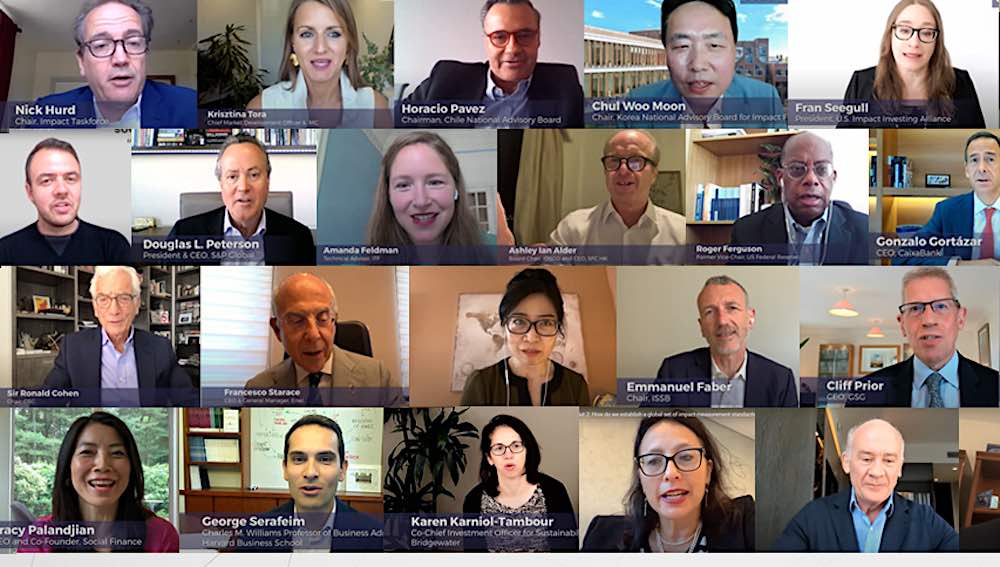Regulators, CEOs, and investors the world over welcome enhanced disclosures. That was the message at the The Global Steering Group for Impact Investment’s Global Impact Series kickoff last week. The event, entitled Financing a Better World Through Impact Transparency, delved deep into the creation and delivery of impact accounting measures aimed at increasing transparency and managing externalities, and featured leaders Bridgewater’s Karen Karniol-Tambour, S&P Global’s Douglas Peterson, Harvard’s George Serafeim and GSG’’s own Sir Ronald Cohen.
Participants in the Global Impact Series debated and agreed on the urgent need for harmonised impact transparency measures and came out in strong support of the standards being developed by the International Sustainability Standards Board, chaired by Emmanuel Faber. The ISSB is building on existing sustainability reporting standards, including TCFD, to create a comprehensive global baseline of sustainability disclosures designed to meet the information needs of investors in assessing enterprise value.
“Our metrics will be ready by the end of this year. We are also going to consolidate the SASB Sustainability Accounting Standards Board (SASB) standards. So, companies can already use them without waiting for local regulation,” said Faber.
The Urgent Need for Impact Transparency
Ashley Alder, Board Chair of the International Organization of Securities Commissions (IOSCO), stressed that the priority for regulators should be to support the ISSB’s efforts around climate reporting. “We need converged standards to navigate through the alphabet soup that has created noise in the system and noise around greenwashing,” Alder said. “If concerns about sustainability are not addressed then sustainability is not sustainable – it will be discredited.”
Jingdong Hua, former Vice-President at the World Bank, cautioned against moving too quickly towards a single set of standards in order to let the best ideas emerge. “We need to let 1,000 flowers bloom – which is a little bit what the ISSB is doing. The sandbox approach is necessary at the beginning. It allows some flexibility, allows best practice to come to the top, and then we choose it.”
The development of the ISSB standards should be the precursor to enforceable regulation that sets out mandatory requirements and legal standards. However, contrary to historical opinion, regulation should be flexible and open to amendment, said Francesco Starace, CEO and General Manager at Enel.
“Regulation needs to be adaptable and changing,” he said. “It is upon the industry to try and explain to regulators what is going to happen next, without fear, so that they understand.”
Gathering the Data
The capture, measurement and analysis of impact data is critical to impact accounting. Businesses and investors first need to ask themselves what questions they want to answer with data, said Karen Karniol-Tambour, who is Co-Chief Investment Officer for Sustainability at Bridgewater.
“Currently, the furthest along is probably measuring your carbon footprint. Wouldn’t you [also] want to know how you are doing in getting to net zero? So, asking that question means that the quality of data will improve,” she explained.
Some businesses are already gathering large amounts of data on emissions to be able meet future requirements. “We have created a big C02 databank, which is a prerequisite to do impact-weighted accounts in the future,” said Saori Dubourg, Member of the Executive Board of BASF.
However, she stressed that not all businesses have the ability to collect and manage such information. “We need to have an eye on small and medium-sized businesses – many have not even heard of impact-weighted accounts. We need a pragmatic approach or else we will lose them. It needs to be very simple.”
George Serafeim, Professor at Harvard Business School at Co-Chair of the Impact-Weighted Accounts Project, is already using pools of data to get the bottom of company actions on impact. “Using data has been very informative about what is actually happening in companies, not just what they say they are doing,” he said.
Measuring impact on climate – as well as social factors – means assessing figures within company accounts and balance sheets, as well as information on the ground in communities.
“Measurement needs data and numbers, but it also needs to be qualitative,” explained Roger Ferguson, former Vice Chair at the Federal Reserve. He expects to see exciting new techniques to leverage big data and create a transparent and holistic view of impact, potentially with data moving beyond climate reporting into social impact.
The Groundswell in Impact
Participants in the Global Impact Series were positive about the accelerating progress in the impact movement, driven by the desire among individuals and investors to do good, yet were also realistic about the challenges.
“There is simply never going to be enough public money to deliver net zero and the SDGs,” admitted Nick Hurd, Chair of the G7 Impact Taskforce. But, he added, “it is striking how quickly the needle of ambition among institutions is moving.”
Douglas L. Peterson, President and CEO at S&P Global, pointed to the speed of development – and ultimate success – of the US’s moon landing project as an example of what could be achieved. With eight years to go to meet the Sustainable Development Goals, there is reason to be hopeful, but it is also time to deliver, he said.
His words were echoed by Starace of Enel, who called on businesses to step up their efforts towards impact. “You need to watch out because time is being compressed. Don’t get caught by the time dimension because it’s shorter than you think. You need to act now.”
Companies will find support among banks and other lenders, who are being driven by their own clients demanding that they do the right thing. “The finance system believes that we have to finance the transition – that is our mission. Companies may not be on the right path yet, but we have to get them there,” said Gonzalo Gortazar, CEO at Caixabank.
“It is imperative for banks to go down this route, because our clients want to go down this route,” added Gortazar.
GSG Chair Sir Ronald Cohen had the final word on the accelerating shift towards acting with impact among consumers, entrepreneurs, activists and philanthropists.
“I emerge from today with a renewed conviction that we have been before the curve on bringing impact to financial analysis and accounting, and ahead of the game pushing for international standards that can be introduced globally in the next 3-5 years,” he concluded.











